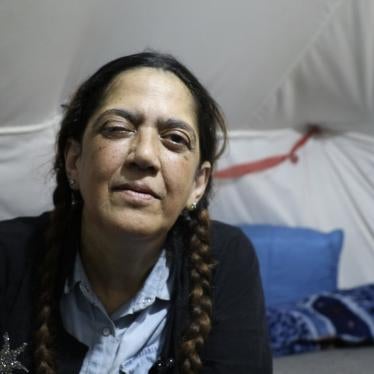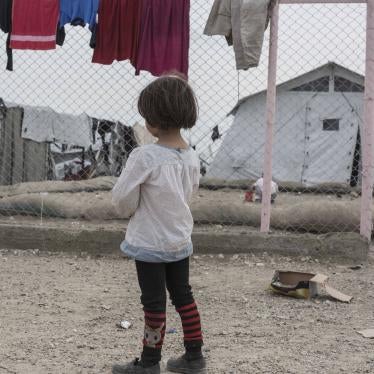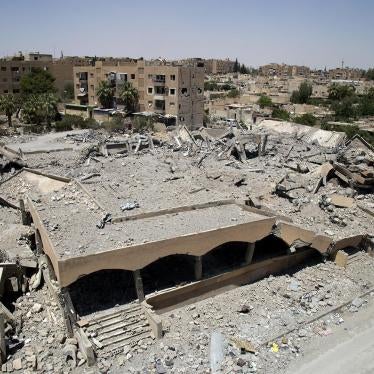Chairman Wolf, Chairman McGovern, members of the Commission: thank you for inviting me to testify today. This is an important hearing.
I would like to share some insights from my recent trip to Iraq where the Islamic State in Iraq and al-Sham, or ISIS, is one, but not the only entity, perpetrating gross and widespread violations of international human rights and humanitarian law.
ISIS’ extraordinary brutality is, of course, well known. Their campaign of killings is remarkably gruesome. They publicize rather than hide their abuses, promote their atrocities via social media, and make clear they don’t subscribe to the same norms, values, laws, and standards that serve to guide the international community. Instead, ISIS employs an overt strategy of cruelty to sow fear and subdue populations under its control, bolstered by tactics that seem to be a throwback to another era.
ISIS hasn’t come from nowhere. To the contrary, it has been gaining strength for quite some time by taking advantage of the brutal crackdown by Syrian and Iraqi authorities, the marginalization of Sunnis that began over a decade ago after the US invasion of Iraq, and the conflict-related chaos in Syria, among other factors. Similarly, the rapid territorial gains ISIS made this summer were largely enabled by the discontent that resulted from the Maliki-led government policies that fed a cycle of sectarian violence through exclusion and discrimination.
Chairman McGovern, Chairman Wolf, more than 12 years after the US-led forces invaded Iraq, it has become quite clear that the country’s transition to a functioning and sustainable democracy built on the rule of law is far from accomplished. Even before ISIS’ dramatic territorial gains earlier this summer, human rights conditions in the country were deteriorating. The rights of even Iraq’s most vulnerable citizens, especially women and detainees, were regularly violated by the government with impunity.
Iraq has been grappling with a weak criminal justice system, plagued by corruption for many years. The courts frequently base convictions on coerced confessions and trial proceedings that fall far short of international standards.Thousands of men and women have been detained without charge, and subject to torture and ill-treatment. Emboldened by the Syrian conflict and multiple political crises in Baghdad, sectarian tensions over the last few years in particular have deepened as Al-Qaeda in Iraq and other insurgent groups have carried out nearly daily attacks against civilians. The past year was far bloodier than the five years before it. 2015 threatens to be even worse.
Before the current counter ISIS campaign, the Iraqi government was fighting a broadly defined counterterrorism campaign that employed draconian and abusive tactics by a heavy-handed security force. A self-generating cycle of violence resulted in suicide attacks, car bombs, and assassinations that became more frequent and lethal, killing more than 12,000 people outside of combat zones over the last year alone.
In December 2013, the Iraqi government attacked largely peaceful demonstrations in Hawija that triggered a renewed conflict in Anbar province between local residents, Iraqi security forces, and multiple armed groups. The fighting, which included indiscriminate attacks by government forces on populated areas along with the use of barrel bombs, killed an unknown number of civilians and displaced close to 500,000 people. The conflict spread north after ISIS took over Mosul, Iraq’s second largest city, on June 10, 2014.
In early October, I went to Iraq and traveled about two hours south of Kirkuk to learn more about the ground fight against ISIS, including the role of pro-government Shia militias. My colleague and I had heard numerous anecdotes about the ransacking of Sunni villages by government-backed militias after the US-coalition airstrikes helped “liberate” Amerli, a predominately Shia town of approximately 12,000 people under ISIS siege for almost two months. While the militias did play a role liberating that village, what we learned that day confirmed a devastating picture of relentless arson, destruction, displacement, and killings committed by various militias, with impunity. At the end of our visit, we pulled off the highway to speak with a family displaced by the recent violence. A man in his late 40s, who was living in an abandoned strip mall, told me, “I am no more afraid of Daesh”—the Arabic acronym for the Islamic State—“than I am of the Shia militias and the Iraqi government.”
The circumstances around the post-Amerli siege are emblematic of a larger and deeply worrisome effort underway throughout much of Iraq as it scales up its counterterrorism campaign with support from the United States: crudely empowered Shia militias are being used to punish the Sunni population on sectarian grounds.
In the weeks that followed my visit, Human Rights Watch went to heard consistent
Meanwhile, ISIS continues to prey on vulnerable communities, including those historically concentrated in the Nineveh plains, such as the Chaldo-Assyrian Christians, Shia Shabaks, Turkmen, and Yezidis. These groups have a long history of marginalization but ISIS has intensified this ostracism, labeling them as crusaders, heretics, and devil-worshipers and then threatening them with death if they don’t convert to Islam.
During my time in Iraq, I visited Duhok, in the northern part of the semi-autonomous region of Kurdistan, to interview young Yezidi men, women and girls who had recently escaped ISIS captivity. They described harrowing tales of cramped detention, abuse, forced conversion, forced marriage, and sexual slavery. One 15-year-old girl we interviewedwho had only arrived back with her family the day beforewas taken from Mosul to Raqqa, Syria. Along the way, she was detained in four different locations, including in Badoush prison, near Mosul, with hundreds of other Yezidis. While there, she said she saw fighters take more than 100 boys, some as young as six years old, from their mothers. Maybe they were sent to be “re-educated” or maybe to a training camp. It is likely they were all forced to convert; maybe some were killed.
When this girl arrived in Raqqa after her grueling journey, she said she was detained in a private home with about 20 other girls, only to be sold a few days later to an ISIS fighter for about $1000.
Another Yezidi girl we interviewed was held captive with her four sisters, the youngest of whom was 10 years old. She shared the story of another young girl, with whom she was detained and who had been “selected” by an older ISIS fighter. He regularly took her to his home, locked her in a room and told his family he was “helping her with her Islamic education.” Instead, he was beating and raping her.
As the Commission Chairmen will recall, this past August, President Obama made clear the United States would “not turn a blind eye”[1] to a Yezidi massacre in Iraq. Certainly, there has been increased attention to the plight of the Yezidis, alongside other vulnerable communities in Iraq, but launching a military operation isn’t a sufficient long-term strategy to protect these groups—or any others.
Indeed, thousands of families have already been torn apart; more than 500,000 Yezidis and other religious minorities have been driven from their homes, most to the semi-autonomous region of Kurdistan, which is already suffering under the strain of some 200,000 Syrian refugees and lacks the resources to mount an adequate response.[2]
But it is not only religious minorities who have been displaced. Thousands of Sunni families are also fleeing violence in other parts of Iraq, including in areas recently “cleared” of ISIS that are less accessible and virtually invisible to the international community. Countrywide, there are now approximately 2 million displaced Iraqis, many of whom have little access to basic services or any meaningful protection.
The grim reality is that ISIS is going to be around for the foreseeable future, as are the conditions that have enabled it to thrive. So instead of thinking predominately about military operations against ISIS, there is a need to shift gears and reflect on how the US can do a better job helping Iraqi civilians find a greater measure of protection while also ensuring US military operations do not inadvertently end up strengthening ISIS appeal to disenfranchised Sunnis. If the US doesn’t take this step, far too many people in Iraq will continue living in brutal conditions, under constant threat from a wide range of abusive actors, and without sufficient support for their most basic human needs.
Recommendations
Addressing the underlying social-political dynamics in Iraq that have been neglected for so many years—by Iraqis officials as well as by donor governments including the United States—is critical to reversing the current downward trajectory. There have been some encouraging signs by Prime Minister Haider al-Abadi but the jury’s still out as to whether they’ll be tied to any meaningful institutional reform. That said, there are some near-term steps Human Rights Watch would like to recommend that could provide a measure of protection and support for those in need.
First, the US needs to be extremely cautious as it scales up its engagement with the Iraqi security forces. The Iraqi security forces are deeply infiltrated and, in some cases, controlled by militias that commit serious abuses with impunity. This means training and equipping the security forces will require a major overhaul of the security forces—and ultimately an elimination of the militias if it is to be not only an effective military force, but a professional, law-abiding one. As a first step, the Leahy Law, which requires human rights vetting of any foreign partner units before such programs can be operationalized, needs to be robustly and consistently implemented. Getting this right means shielding the United States from engaging with an extensively abusive and corrupt army. In general, an increase in train and equip programs need to be incorporated into a wider plan for reform that seeks to build an integrated force that is fully respectful of civilian protection.
Certain security force units well known for their abusive tactics should be omitted from the reform process until the government takes steps towards remediation. Congress should also press the administration to develop clear policy guidance on how diplomats and military officials can support the Iraqis and other foreign governments to promote accountability. As you may know, the Leahy Law requires the administration to offer related assistance but this area of the law and associated policy are woefully underdeveloped. Finally, on this point, strong congressional oversight will be essential to ensure Baghdad does not funnel US government-issued weapons and equipment to Shia militias or into their own pockets, which appears to be happening already with some regularity.
Second, the administration needs to make sure that the Iraqi government is upholding its commitment to stop shelling civilians. In September, Prime Minister Abadi ordered his army to stop shelling populated areas in order to spare civilian lives. This order, which was made during a press conference, was an important rhetorical commitment to the lives of all Iraqis. But only days after it was made, the attacks began anew. The administration—with support from Congress— should make clear that deliberate or indiscriminate attacks against civilians are unacceptable, not to mention illegal, and that additional military cooperation between the United States and Iraq will require a renewed call, backed up by clear benchmarks for implementation.
Third, the US needs to scale-up support for non-military initiatives throughout the country, whether through independent activists, media, relief aid, or civil society organizations. Such support is an important counter balance to military operations and helps promote a culture of oversight and public accountability—both of which are sorely missing.
In northern Iraq, this assistance should include support for local and international organizations to increase medical and counseling services for displaced people who fled ISIS. Programs should be geared towards the confidential needs of people who have survived sexual violence, including comprehensive post-rape care. Access to Iraqis outside Kurdistanand information about the conditions in which they’re livingremains extremely limited. Scaled-up support to impartial groups, including in the Anbar region, should be a priority and would indicate a commitment to all Iraqis.
Thank you and I’m happy to take your questions.
[1] White House, “Statement by the President,” August 7, 2014, http://www.whitehouse.gov/the-press-office/2014/08/07/statement-president (accessed December 8, 2014).
[2] UNHCR, “Syria Regional Refugee Response,” 2014, http://data.unhcr.org/syrianrefugees/country.php?id=103 (accessed December 8, 2014).






